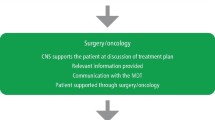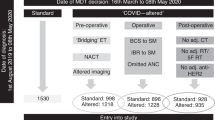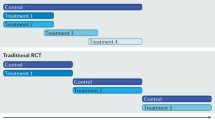Abstract
Harmonious interactions between radiation, medical, interventional and surgical oncologists, as well as other members of multidisciplinary teams, are essential for the optimization of patient care in oncology. This multidisciplinary approach is particularly important in the current landscape, in which standard-of-care approaches to cancer treatment are evolving towards highly targeted treatments, precise image guidance and personalized cancer therapy. Herein, we highlight the importance of multidisciplinarity and interdisciplinarity at all levels of clinical oncology training. Potential deficits in the current career development pathways and suggested strategies to broaden clinical training and research are presented, with specific emphasis on the merits of trainee involvement in functional multidisciplinary teams. Finally, the importance of training in multidisciplinary research is discussed, with the expectation that this awareness will yield the most fertile ground for future discoveries. Our key message is for cancer professionals to fulfil their duty in ensuring that trainees appreciate the importance of multidisciplinary research and practice.
This is a preview of subscription content, access via your institution
Access options
Subscribe to this journal
Receive 12 print issues and online access
$209.00 per year
only $17.42 per issue
Buy this article
- Purchase on Springer Link
- Instant access to full article PDF
Prices may be subject to local taxes which are calculated during checkout



Similar content being viewed by others
References
American Society of Clinical Oncology. The state of cancer care in America 2015. ASCO http://www.asco.org/sites/www.asco.org/files/2015ascostateofcancercare.pdf (2015).
The Royal College of Radiologists. Clinical Oncology UK workforce census 2014 report. RCR https://www.rcr.ac.uk/sites/default/files/publication/bfco152_census.pdf (2014).
Frohman, H. A. et al. The nonwhite woman surgeon: a rare species. J. Surg. Educ. 72, 1266–1271 (2015).
Royal College of Surgeons. Women in surgery, submission to House of Commons Science and Technology Committee, August 2013. RCS https://www.rcseng.ac.uk/about-the-rcs/government-relations-and-consultation/position-statements-and-reports/surgical-profession/ (2013).
Royal College of Surgeons. Women in surgery — statistics. RCS https://www.rcseng.ac.uk/careers-in-surgery/women-in-surgery/mission-and-goals/women-surgeon-statistics/ (2015).
International Agency for Research on Cancer. GLOBOCAN 2012. Estimated cancer incidence, mortality and prevalence worldwide in 2012. IARC http://globocan.iarc.fr/old/burden.asp?selection_pop=207840&Text-p=United+States+of+America&selection_cancer=290&Text-c=All+cancers+excl.+non-melanoma+skin+cancer&pYear=8&type=0&window=1&submit=%C2%A0Execute%C2%A0 (2013).
Datta, N. R., Samiei, M. & Bodis, S. Radiotherapy infrastructure and human resources in Europe — present status and its implications for 2020. Eur. J. Cancer 50, 2735–2743 (2014).
Sharma, R. A. et al. Radioembolization of liver metastases from colorectal cancer using yttrium-90 microspheres with concomitant systemic oxaliplatin, fluorouracil, and leucovorin chemotherapy. J. Clin. Oncol. 25, 1099–1106 (2007).
Dutton, S. J. et al. FOXFIRE protocol: an open-label, randomised, phase III trial of 5-fluorouracil, oxaliplatin and folinic acid (OxMdG) with or without interventional Selective Internal Radiation Therapy (SIRT) as first-line treatment for patients with unresectable liver-only or liver-dominant metastatic colorectal cancer. BMC Cancer 14, 497 (2014).
The Accreditation Council for Graduate Medical Education & The American Board of Radiology. The Radiation Oncology Milestone Project. ACGME https://www.acgme.org/acgmeweb/Portals/0/PDFs/Milestones/RadiationOncologyMilestones.pdf (2015).
Lagendijk, J. J., Raaymakers, B. W. & van Vulpen, M. The magnetic resonance imaging-linac system. Semin. Radiat. Oncol. 24, 207–209 (2014).
Thorwarth, D. Functional imaging for radiotherapy treatment planning: current status and future directions — a review. Br. J. Radiol. 88, 20150056 (2015).
Bird, D. et al. Multimodality imaging with CT, MR and FDG-PET for radiotherapy target volume delineation in oropharyngeal squamous cell carcinoma. BMC Cancer 15, 844 (2015).
Chino, J., Doyle, S. & Marks, L. B. The anatomy of radiation oncology residency training. Int. J. Radiat. Oncol. Biol. Phys. 88, 3–4 (2014).
The Royal College of Radiologists. The timely delivery of radical radiotherapy: standards and guidelines for the management of unscheduled treatment interruptions. RCR https://www.rcr.ac.uk/system/files/publication/field_publication_files/BFCO(08)6_Interruptions.pdf (2008).
Tree, A. C. et al. Stereotactic body radiotherapy for oligometastases. Lancet Oncol. 14, e28–e37 (2013).
Aitken, K. et al. Initial UK experience of stereotactic body radiotherapy for extracranial oligometastases: can we change the therapeutic paradigm? Clin. Oncol. (R. Coll. Radiol.) 27, 411–419 (2015).
Shah, D. R. et al. Current oncologic applications of radiofrequency ablation therapies. World J. Gastrointest. Oncol. 5, 71–80 (2013).
Sharma, R. A. et al. Clinical development of new drug–radiotherapy combinations. Nat. Rev. Clin. Oncol. 13, 627–642 (2016).
Goranov, B. B. et al. Academic opportunities within clinical oncology training. Clin. Oncol. (R. Coll. Radiol.) 25, 446 (2013).
Thiruthaneeswaran, N. et al. Promoting a research culture among junior radiation oncologists: outcomes from the introduction of the Australian and New Zealand research requirement in training. Clin. Oncol. (R. Coll. Radiol.) 26, 162–173 (2014).
Berman, A. T. et al. Is there a need for resident training in clinical trial design? Int. J. Radiat. Oncol. Biol. Phys. 88, 969–970 (2014).
National Institute for Health Research. NIHR integrated academic training programme for doctors and dentists. NIHR http://www.nihr.ac.uk/funding-and-support/funding-for-training-and-career-development/training-programmes/integrated-academic-training-programme/ (2015).
European Society for Medical Oncology. Homepage. http://www.esmo.org.
Society of Interventional Radiology. Medical Student Council. RFS http://rfs.sirweb.org/wordpressnstall/medical-student-section/ (2016).
Bennett, J. M., Sahasrabudhe, D. M. & Hall, W. J. Medical oncology and geriatric medicine: is it time for fellowship integration? Cancer 80, 1351–1353 (1997).
Terret, C. Management and geriatric assessment of cancer in the elderly. Expert. Rev. Anticancer Ther. 4, 469–475 (2004).
American Society of Clinical Oncology. Geriatric oncology resources. ASCO https://www.asco.org/practice-guidelines/cancer-care-initiatives/geriatric-oncology/geriatric-oncology-resources.
European Society for Medical Oncology. ESMO Handbook of Cancer in the Senior Patient (eds Aapro, M. S. & Schrijvers, D.) (ESMO; 2015).
International Society of Geriatric Oncology. Homepage. http://siog.org/.
Kalsi, T. et al. Are the UK oncology trainees adequately informed about the needs of older people with cancer? Br. J. Cancer 108, 1936–1941 (2013).
Horgan, A. M. et al. Impact and feasibility of a comprehensive geriatric assessment in the oncology setting: a pilot study. Am. J. Clin. Oncol. 35, 322–328 (2012).
Hiley, C. T. et al. Challenges in molecular testing in non-small-cell lung cancer patients with advanced disease. Lancet 388, 1002–1011 (2016).
Atkins, M. B. & Larkin, J. Immunotherapy combined or sequenced with targeted therapy in the treatment of solid tumors: current perspectives. J. Natl Cancer Inst. 108, djv414 (2016).
Zhang, T. et al. The efficacy and safety of anti-PD-1/PD-L1 antibodies for treatment of advanced or refractory cancers: a meta-analysis. Oncotarget http://dx.doi.org/10.18632/oncotarget.12230 (2016).
Joint Royal College of Physicians Training Board. Speciality training curriculum for medical oncology. GMC http://www.gmc-uk.org/2010__AUC__Medical_Oncology_curriculum_AUC.pdf_56436828.pdf (2010).
The Royal College of Radiologists. Clinical oncology — the future shape of the specialty. RCR https://www.rcr.ac.uk/sites/default/files/bfco144_co_shape_of_specialty.pdf (2014).
National Institutes of Health. Mentored Clinical Scientist Research Career Development Award. NIH https://researchtraining.nih.gov/programs/career-development/K08 (2016).
National Institutes of Health. Mentored Patient-Orientated Research Career Development Award. NIH https://researchtraining.nih.gov/programs/career-development/K23 (2016).
National Institute for Health Research. NIHR Clinical Research Network Cancer. NIHR https://www.crn.nihr.ac.uk/cancer/ (2016).
Adam, A. & Kenny, L. M. Interventional oncology in multidisciplinary cancer treatment in the 21(st) century. Nat. Rev. Clin. Oncol. 12, 105–113 (2015).
Breen, D. J. & Lencioni, R. Image-guided ablation of primary liver and renal tumours. Nat. Rev. Clin. Oncol. 12, 175–186 (2015).
Society of Interventional Radiology. New IR residency and IR/DR certificate: future direction of the specialty. SIRWEB http://www.sirweb.org/clinical/IR_DR_cert.shtml (2016).
Cardiovascular and Interventional Radiological Society of Europe. Homepage. http://www.cirse.org.
World Conference on Interventional Oncology Events. Homepage. http://www.wcioevents.org.
European Conference on Interventional Oncology. Congresses. ECIO http://www.ecio.org/index.php?pid=9.
Synergy. Homepage. http://synergymiami.org.
The Annual Symposium on Cinical Interventional Oncology. Homepage. http://www.iset.org/oncology/.
The Royal College of Radiologists. Interventional oncology: guidance for service delivery. RCR https://www.rcr.ac.uk/system/files/publication/field_publication_files/RCR(13)_IO_0.pdf (2013).
Sharma, R. A., Cummins, C. & Crellin, A. Selective internal radiotherapy of the liver: at the crossroads of interventional oncology research and national health service commissioning. Clin. Oncol. (R. Coll. Radiol.) 26, 733–735 (2014).
LaBerge, J. M. & Anderson, J. C. & Radiology Review Committee. A guide to the Interventional Radiology residency program requirements. J. Am. Coll. Radiol. 12, 848–853 (2015).
Society of Interventional Radiology. Residents, Fellows and Student section. RFS http://rfs.sirweb.org/wordpressnstall/ (2016).
Kaufman, J. A. The interventional radiology/diagnostic radiology certificate and interventional radiology residency. Radiology 273, 318–321 (2014).
Commander, C. W. et al. Assessing medical students' knowledge of IR at two American medical schools. J. Vasc. Interv. Radiol. 25, 1801–1806 (2014).
Benedetti, N. J., Naeger, D. M. & Webb, E. M. Radiology primer: a novel radiology course for undecided medical students. J. Am. Coll. Radiol. 11, 1182–1185 (2014).
Treasure, T. & Morton, D. GRIST: growing recruitment in interventional and surgical trials. J. R. Soc. Med. 105, 140–141 (2012).
The Association for Cancer Surgery. BASO trainees. BASO http://www.baso.org.uk/baso-trainees.aspx.
Mackenzie, H. et al. Design, delivery, and validation of a trainer curriculum for the national laparoscopic colorectal training program in England. Ann. Surg. 261, 149–156 (2015).
Franklin, J. M. et al. Clinical trials of interventional oncology — moving from efficacy to outcomes. Nat. Rev. Clin. Oncol. 12, 93–104 (2015).
McCulloch, P. et al. No surgical innovation without evaluation: the IDEAL recommendations. Lancet 374, 1105–1112 (2009).
Department of Health. Good clinical practice for clinical trials. gov.uk https://www.gov.uk/guidance/good-clinical-practice-for-clinical-trials (2016).
Lee, M. J. et al. Academic requirements for Certificate of Completion of Training in surgical training: consensus recommendations from the Association of Surgeons in Training/National Research Collaborative Consensus Group. Int. J. Surg. http://dx.doi.org/10.1016/j.ijsu.2016.08.236 (2016).
Foxtrot Collaborative Group. Feasibility of preoperative chemotherapy for locally advanced, operable colon cancer: the pilot phase of a randomised controlled trial. Lancet Oncol. 13, 1152–1160 (2012).
Bhangu, A., Fitzgerald, J. E. & Kolias, A. G. Trainee-led research collaboratives: a novel model for delivering multi-centre studies. ANZ J. Surg. 84, 902–903 (2014).
Bhangu, A. Safety of short, in-hospital delays before surgery for acute appendicitis: multicentre cohort study, systematic review, and meta-analysis. Ann. Surg. 259, 894–903 (2014).
National Research Collaborative. Homepage. http://www.nationalresearch.org.uk/.
Pinkney, T. D. et al. Impact of wound edge protection devices on surgical site infection after laparotomy: multicentre randomised controlled trial (ROSSINI Trial). BMJ 347, f4305 (2013).
West Midlands Research Collaborative. MASDA. WM Research http://wmresearch.org.uk/?page_id=477 (2015).
Bowel Disease Research Foundation. Bowel disease research foundation funded projects. BDRF http://www.bdrf.org.uk/research/projects/ (2016).
STARSurg Collaborative. Impact of postoperative non-steroidal anti-inflammatory drugs on adverse events after gastrointestinal surgery. Br. J. Surg. 101, 1413–1423 (2014).
Saini, K. S. et al. Role of the multidisciplinary team in breast cancer management: results from a large international survey involving 39 countries. Ann. Oncol. 23, 853–859 (2012).
De Ieso, P. B. et al. A study of the decision outcomes and financial costs of multidisciplinary team meetings (MDMs) in oncology. Br. J. Cancer 109, 2295–2300 (2013).
Lamb, B. W. et al. Strategies to improve the efficiency and utility of multidisciplinary team meetings in urology cancer care: a survey study. BMC Health Serv. Res. 14, 377 (2014).
Kesson, E. M. et al. Effects of multidisciplinary team working on breast cancer survival: retrospective, comparative, interventional cohort study of 13 722 women. BMJ 344, e2718 (2012).
Ellis, P. M. The importance of multidisciplinary team management of patients with non-small-cell lung cancer. Curr. Oncol. 19 (Suppl. 1), S7–S15 (2012).
Kissane, D. W. et al. Communication skills training for oncology professionals. J. Clin. Oncol. 30, 1242–1247 (2012).
Kash, K. M. et al. Stress and burnout in oncology. Oncology (Williston Park) 14, 1621–1633 (2000).
Sackett, D. L. Rules of evidence and clinical recommendations on the use of antithrombotic agents. Chest 95 (2 Suppl.), 2S–4S (1989).
Howe, M. & Burkes, R. L. Collaborative care in NSCLC; the role of early palliative care. Front. Oncol. 4, 192 (2014).
Tree, A. et al. Successful patient acceptance of randomization within the PACE study (Prostate Advances in Comparative Evidence). Int. J. Radiat. Oncol. Biol. Phys. 87 (2 Suppl.), S365 (2013).
Plastaras, J. P., Berman, A. T. & Freedman, G. M. Special cases for proton beam radiotherapy: re-irradiation, lymphoma, and breast cancer. Semin. Oncol. 41, 807–819 (2014).
Parker, C. et al. Alpha emitter radium-223 and survival in metastatic prostate cancer. N. Engl. J. Med. 369, 213–223 (2013).
Weber, W. A. PET/MR Imaging: a critical appraisal. J. Nucl. Med. 55 (Suppl. 2), 56S–58S (2014).
Acknowledgements
A.C.T. receives support from the NIHR RMH/ICR Biomedical Research Centre. V.K. and B.J.W. are supported by the NIH Center for Interventional Oncology, The National Cancer Institute, and the Intramural Research Program of the National Institutes of Health. R.A.S. is supported by Cancer Research UK, the CRUK-EPSRC UCL Cancer Imaging Centre and the NIHR University College London Hospitals Biomedical Research Centre. The opinions expressed herein are those of the authors in their personal capacity and do not necessarily represent those of any institution, the National Institutes of Health, nor any government entity.
Author information
Authors and Affiliations
Contributions
A.C.T. and R.A.S. conceived the idea for this article and coordinated all activities. All authors researched the data for the article and generated ideas for the content. A.C.T., V.H., A.B. and V.K. contributed equally to writing the article and the creation of display items, and all authors reviewed and/or edited the manuscript.
Corresponding author
Ethics declarations
Competing interests
A.C.T. receives research funding from Accuray, Elekta and MSD, and has received travel support or honoraria from Astellas, Bayer and Janssen. R.A.S. has received research funding from Sirtex Technology and consultation fees from Affidea, Astra Zeneca, BTG, Cancer Research Technology, Eisai, Sirtex Medical, Varian and Vertex. The other authors declare no competing interests.
Related links
FURTHER INFORMATION
Rights and permissions
About this article
Cite this article
Tree, A., Harding, V., Bhangu, A. et al. The need for multidisciplinarity in specialist training to optimize future patient care. Nat Rev Clin Oncol 14, 508–517 (2017). https://doi.org/10.1038/nrclinonc.2016.185
Published:
Issue Date:
DOI: https://doi.org/10.1038/nrclinonc.2016.185
This article is cited by
-
Results of a nationwide survey on multidisciplinary teams on thyroid cancer in Spain
Clinical and Translational Oncology (2019)



